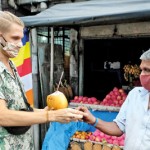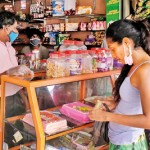News
Stranded tourists keep spirits up despite coronavirus woes
- Tourism Promotion Bureau Director General Dhammika Wijayasinghe
- Nico Poknifco from Germany: Lucky to be in Sri Lanka
- Ayala Nagauker from Israel believes locals are helpful
- Surf teacher Loome: some locals see white tourists as Covid spreaders
- Julias: The situation here is better than that of Russia, his home country
- Andriyas and Stive Sabrina (left) from Switzerland walking back to thier hotel room in Mirissa after a visit to a nearby grocery shop
The Mirissa beach would have been bustling with tourists during this period, if not for the coronavirus threat.
This Matara district resort area is more or less a microcosm of most coronavirus-hit tourist hotspots in the country. Hotels are almost deserted, most of them closed and the staff sent on leave.
Occasionally, a few tourists are seen on the roads, riding motorcycles or walking to market places. Their presence raises hopes of thousands of locals who depend on the industry.
A majority of tourists left the country with the outbreak of the coronavirus pandemic, but some still remain in the country enjoying the holiday while taking precautions to protect them from the virus.
Among them are Andriyas and Stive Sabrina from Switzerland. They are in their sixth week in Sri Lanka, spending their time in a small hotel in Mirissa .
“When the curfew is relaxed, we go out to buy some essentials, otherwise we stay inside,” Sabrina says.
The couple have been in contact with Sri Lanka Tourism through internet for necessary updates. They believe they are fortunate to be in the south, where the situation is well under control, compared to Colombo.
They are also in contact with their family members in Switzerland.
We also met Russian tourists Julias, 24 and his girlfriend. In Sri Lanka since November last year, they count themselves lucky to be here because the situation here is much better than their home country Russia.
“Staying in Sri Lanka is better than any other country, because the coronavirus crisis is far worse in countries like India, Indonesia and Thailand. The Sri Lankan government is supportive of tourists and protect them,” he says. “I think the crisis will end in Sri Lanka by July but it may go on until the end of the year in other countries.”
Victor Loome, 29, has been in Sri Lanka for the past several year. He taught surfing to tourists in Weligama. He is also from Russia and is confident that in two to three months, the situation in Sri Lanka will return to normal. He laments the surf school has not got tourists since March.
He says he believes world leaders are economical with the truth and not sharing everything they know about the crisis with the ordinary people. “In my country, the situation is not stable. Nobody knows what’s going on, people are afraid. Nobody tells us what’s happening in the world. Looks like all the leaders of all countries know something but they don’t reveal the truth to the normal people like us,” he says.
To cater to the few tourists like Loome, a few restaurants operate in the area.
However, Loome is uncomfortable because he feels the relationship between the locals and tourists has strained since the outbreak of the Covid-19 pandemic.
“I understand they think white people are spreading the virus. I feel a bit insecure,” he says.
But Ayala Nagauker, 43, from Israel believes the locals are helpful. She still goes out to the beach and enjoys herself. “I arrived here in November for the season. The area was full of tourists. Then it began to change all of a sudden. Almost every tourist facility closed its door and the season ended very early. But I’m still happy, because, the environment is quiet. We can still go to the beach and relax,” she says.
She misses her home country and awaits the resumption of flights to get back home.
Nico Poknifco, 25, from Germany has been in Sri Lanka for five months. He believes that the Sri Lankan situation is better than that of his own country.
“I have my schedule. I read books, do lots of exercises, but I am bored. Every day is same, same, same,” he says.
Weligama’s Assistant Divisional Secretary W.V.P. Anura says they are not sure of the exact number of foreigners still remaining in the area but he believes the figure to be around 300.
He says there’s no legal issue with their stay, as their visas have been extended while most of them have
long period visas for six months to one year.
Health officials say no tourist has been put under self quarantine, though some 150 locals had been self-quarantined earlier in the area.
According to Tourism Promotion Bureau Director General Dhammika Wijayasinghe, some 11,000 persons who have arrived on tourists visas were still in the country as at last Thursday. But she is not sure whether all of them are here on tourist purposes.
Most of them are from India — about 2,500. Others include about 1700 Chinese, 850 British, 730 Canadians, 610 Russians, 410 Americans, 370 Dutch citizens and about 40 Australians.
“We have established a help desk for tourists to get information on our hotline 1992. After realising the financial difficulties of some tourists, we have transferred some of them to low cost hotels,” she says, adding that Sri Lanka Tourism is working with the Foreign Ministry regarding tourist welfare.
She says they have written to the Prime Minister, urging the government to declare the tourism sector as an essential service. This will facilitate the fast recovery of the sector and enable the staff to travel from homes to their workplaces even during the lockdown.
“We have to establish a vigorous monitoring system in the future in collaboration with the Civil Aviation Authority and the Department of Immigration and Emigration. We are going to establish an app, requiring foreigners entering the country to install and register with the app. This will enable us to trace them, understand their activities and help them in a crisis,” she says.








